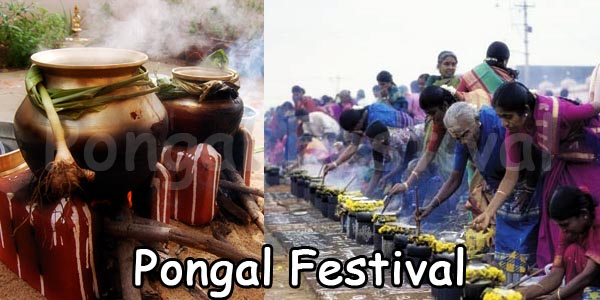There are legendary stories associated with celebration of ‘Pongal’ festival. Two most popular legends of ‘Pongal’ stories are related to Lord Shiva and Lord Indra.
According to a legend, Shiva told his bull, Basava, to descend to Earth. Shiva instructed to request mortals to oil massage and bath every day and eat once a month. Accidentally, Basava told mortals to eat daily and take oil baths once a month. Shiva was annoyed so he cursed and banished Basava to live on Earth forever. Basava had to plough the fields to help produce more food. Hence, there is association of this legend with honouring cattle on third day of ‘Pongal’.
According to another legend, Lord Indra and Lord Krishna also led to ‘Pongal’ festivities. During childhood, Lord Krishna decided to humble Lord Indra, arrogant king of all deities. Lord Krishna requested all cowherds to stop worshiping Lord Indra. This annoyed Lord Indra so he sent his clouds that brought thunder-storms three consecutive days. Lord Krishna lifted Mount Govardhan with his little finger to save all living beings. Lord Indra realised his mistake and appreciated the divine power of Lord Krishna.
‘Pongal’ Celebrations:
According to Hindu mythology, ‘Pongal’ is when day of Gods begins. Festival is always held after six months of long nights. It is celebrated for over three days. This is the most important festival and very eagerly celebrated harvest festival of south India. Special puja is performed on the first day of ‘Pongal’ before cutting of paddy. Farmers worship sun and earth by anointing their ploughs and sickles with sandalwood paste. They use these consecrated tools to cut the newly-harvested rice.
Different festivities are celebrated on each of the three days. The first day, ‘Bhogi Pongal’, is for the family. The second day, Surya ‘Pongal’, is dedicated to worshiping of Surya, the Sun God. Boiled milk and jaggery are offered to Sun God. The third day of ‘Pongal’, ‘Mattu Pongal’, is for worshiping cattle or ‘Mattu’. Cattle are bathed. Their horns are polished and painted with bright colours. Floral garlands are placed around their necks. ‘Pongal’ offered to Gods is given to cattle and birds to eat.
Legends of ‘Pongal’:
All festivals have some interesting legends associated with them. Much awaited ‘Pongal’ of Tamil Nadu in south India has interesting legends associated with it. Most popular legends in connection with ‘Pongal’ festival celebration are discussed below:
Legend of Mount Govardhan:
The first day, ‘Bhogi Pongal’ is associated with legend of Lord Indra and Lord Krishna. Lord Indra is God of clouds and rains. Earlier, people worshiped Lord Indra known as King of deities. Thus honoured, Lord Indra became arrogant thinking himself to be most powerful of all beings. During his childhood, Krishna learned about Lord Indra and decided to teach him a lesson. Krishna persuaded his cowherd friends to worship Mt. Govardhan instead of Lord Indra. As a result, Lord Indra became very annoyed so he sent clouds. There was continuous thunder, lightning, heavy rains and floods in the land. According to the legend, Krishna lifted the huge Govardhan Parvat on his little finger. Thus, Krishna protected cowherds, cattle and human beings from ravaging storm of Lord Indra. The heavy rains and thunder storm continued for three consecutive days. Finally, Lord Indra realised his mistake and acknowledged the divine power of Lord Krishna. Lord Indra promised meekness and he begged Krishna’s forgiveness. Ever since then, Krishna approved of honouring Lord Indra on ‘Bhogi Pongal’ celebration. ‘Bhogi’ is also known as ‘Indran’ in honour of Lord Indra in connection to the legend.
Legend of Lord Shiva:
Third day of ‘Pongal’ or ‘Mattu Pongal’ honours the cattle, both cows and bulls. According to legend, Lord Shiva asked his bull mount Nandi [Basava] to descend to Earth. He instructed Nandi to request mortals to oil-massage, bathe daily but eat once a month. However, accidently Nandi told people to take oil massage, bath once a month and eat daily. Enraged Shiva cursed Basava because of this mistake. Also, Lord Shiva mentioned there would be lack of grains on Earth. Shiva banished Nandi to live on Earth forever to help people plough fields. Hence, ‘Mattu Pongal’ is associated with cattle and it is also called ‘Kanu Pongal’. This festival is celebrated similar to ‘Raksha Bandhan’ and ‘Bhai Dooj’ of north India. On this special day, in Maharashtra, married women are invited for ‘Haldi-Kumkum’. Invited women are gifted any utensil bought by women of the house on that day. A newlywed woman gives away oil, cotton and sesame seeds symbolising auspicious ‘Makar Sankranti’. It is believed this act gives newlywed woman and her family long prosperous lives.
